2019教师资格证面试英语试讲必备40句常用语_846
- 格式:doc
- 大小:15.50 KB
- 文档页数:4
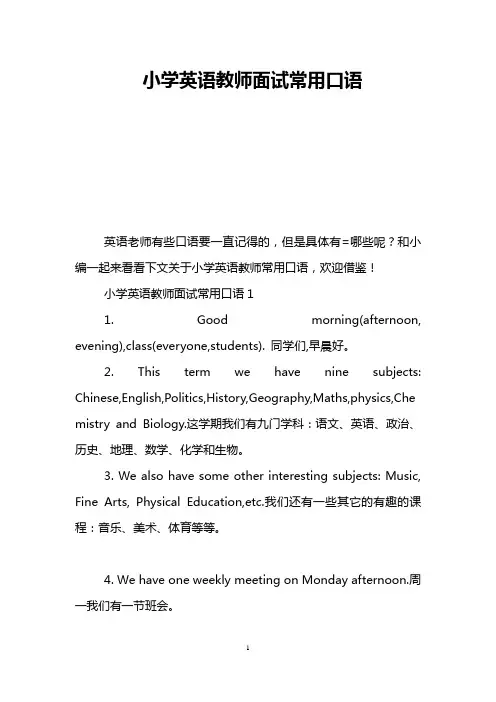
小学英语教师面试常用口语英语老师有些口语要一直记得的,但是具体有=哪些呢?和小编一起来看看下文关于小学英语教师常用口语,欢迎借鉴!小学英语教师面试常用口语11. Good morning(afternoon, evening),class(everyone,students). 同学们,早晨好。
2. This term we have nine subjects: Chinese,English,Politics,History,Geography,Maths,physics,Che mistry and Biology.这学期我们有九门学科:语文、英语、政治、历史、地理、数学、化学和生物。
3. We also have some other interesting subjects: Music, Fine Arts, Physical Education,etc.我们还有一些其它的有趣的课程:音乐、美术、体育等等。
4. We have one weekly meeting on Monday afternoon.周一我们有一节班会。
5. The head teacher of our class is Mr.Zhang.我们的班主任是张老师。
6. You must be polite and say hi to them when you see the teacher.见到老师要礼貌,要问好。
7. When you come into our school, you must speak Putonghua.一进学校,你就要讲普通话。
8. The Chinese lessons are very important。
语文课对于我们来说相当重要。
9. We should study it more carefully than before.我们要比以前更加认真地。
10. If you study Chinese it’s very easy, but if you don’t it’s very hard.对于汉语,你学它就不难,你不学它就显得挺难。
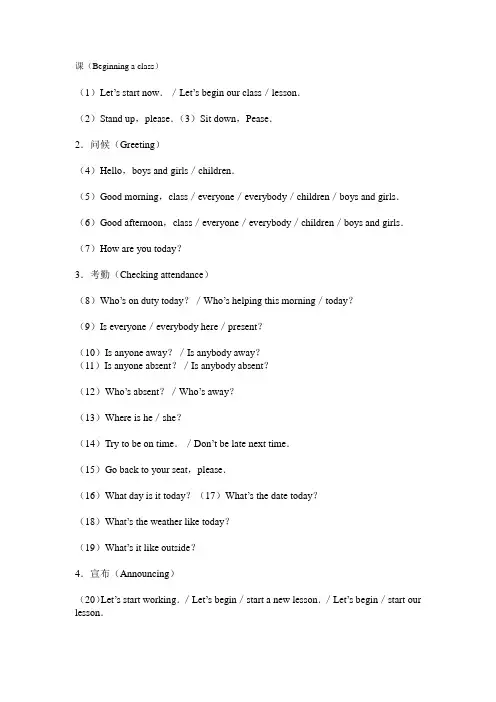
课(Beginning a class)(1)Let’s start now./Let’s begin our class/lesson.(2)Stand up,please.(3)Sit down,Pease.2.问候(Greeting)(4)Hello,boys and girls/children.(5)Good morning,class/everyone/everybody/children/boys and girls.(6)Good afternoon,class/everyone/everybody/children/boys and girls.(7)How are you today?3.考勤(Checking attendance)(8)Who’s on duty today?/Who’s helping this morning/today?(9)Is everyone/everybody here/present?(10)Is anyone away?/Is anybody away?(11)Is anyone absent?/Is anybody absent?(12)Who’s absent?/Who’s away?(13)Where is he/she?(14)Try to be on time./Don’t be late next time.(15)Go back to your seat,please.(16)What day is it today?(17)What’s the date today?(18)What’s the weather like today?(19)What’s it like outside?4.宣布(Announcing)(20)Let’s start working./Let’s begin/start a new lesson./Let’s begin/start our lesson.(21)First,let’s review/do some review.(22)What did we learn In the last lesson?(23)Who can tell/remember what we did In the last lesson/yesterday?(24)Now we’re going to do something new/different./Now let’s learn something new.(25)We have some now words/sentences.5.提起注意(Directing attention)(26)Ready?/Are you ready?(27)Did you get there?/Do you understand?(28)Is that clear?(29)Any volunteers?30)Do you know what to do?(31)Be quiet,please./Quiet,please.(32)Listen,please.(33)Listen carefully,please.(34)Listen to the tape recorder/the recording.(35)Look carefully,please.(36)Look over here.(37)Watch carefully.(38)Are your watching?(39)Please look at the black-board/picture/map…(40)Pay attention to your spelling/pronunciation.6.课堂活动(Classroom activities)(41)Start!/Start now.(42)Everybody together./All together.(43)Practise in a group./Practise In groups/In groups,please.(44)Get into groups of three/four…(45)Every body find a partner/friend.46)In pairs,please.(47)One at a time./Let’s do It one by one.(48)Now you,please./Your turn(Students name).(49)Next,please.Now you do the same,please.(50)Let’s act./Let’s act out/do the dialogue.(51)Who wants to be A?(52)Practise the dialogue,please.(53)Now Tom will be A,and the other half will be B.(54)Please take(play)the part of…(55)Whose turn is It?(56)It’s your turn. (57)Wait your turn,please.(58)Stand inline./Line up.(59)One by one./One at a time,please.(60)In twos./In pairs.(61)Don’t speak out.(62)Turn around.7.请求(Request)(63)Could you please try It again?(64)Could you please try the next one?(65)Will you please help me?8.鼓励(Encouraging)(66)Can you try?(67)Try,please.(68)Try your best./Do your best.(69)Think it over and try again.(70)Don’t be afraid/shy.9.指令(Issuing a command)(7)Say/Read after me,please.(72)Follow me,please.(73)Do what do.(7)Repeat,please./Repeat after me.(75)Once more,please./One more time,please.(7)Come here,please.(77)Please come to the front./Come up and write on the blackboard/chalkboard.(78)Come and write It on the blackboard.(79)Please go back to your seat.(80)In English,please.(81)Put your hand up,please.Raise your hand,please.(82)Put your hands down,please./Hands down,please.(83)Say it/Write it in Chinese/English.(84)Please take out your books.(85)Please open your books at page…/Find page…/Turn to Page…(86)Please answer the question/questions./Please answer my qllllst1On(s).(87)Please read this letter/word/sentence out loud./Please readout this letter /word/sentence.(88)Please stop now./Stop now,please./Stop here,please.(89)Clean up your desk/the classroom,please.(90)It’s clean-up time./Tidy up your desk/the classroom.(91)Put your things away./Clean off your desk./Pick up the scraps·(92)Clean the blackboard.(93)Plug in the tape-recorder,please.(94)Put the tape-recorder away.(95)Put the tap,In it’s box/cassette.(96)Listen and repeat.(97)Look and listen.(98)Repeat after me.(99)Follow the words.(100)Fast./Quickly!/Be quick,please.(101)Hurry!/Hurry up,please.(102)Slow down,please.(10)Slowly.(104)Bring me some chalk,please.10.禁止和警告(Prohibition and warning)(105)Stop talking./Stop talking now,please.(106)Don’t talk./Everybody quiet,please.(107)Don’t be silly.(108)Settle down.11.评价(109)Good,thank you.(10)Good/Very good./God job./Good work./Good example.(111)A good answer./Nice work.(112)Excellent./Great!/Well done./Very good./I like the way you(13)That’s Interesting(114)Don’t worry about It./No problem.(115)OK!/That’s OK.(116)I don’t think so.(117)That’s not quite right,any other answers?/That’s close/That’s almost right.(118)Not quite,can anyone help him/her?/try again.(119)A good try.12.布置作业(Setting homework)(120)For today’s homework…(121)Practise after class./Practise at home.(122)Say it out loud,before you write It down.(123)Copy/Print/Write each word twice.(124)Remember(Memorize)these words/sentences.(125)Learn these words/these sentences/this text by heart.(126)Do your homework./Do the next lesson./Do the new work.13.下课(Dismissing the class)(127)Hand in your workbooks,please.(128)Time is up.(129)The bell is ringing.(130)There’s the bell.(131)There goes the bell.(132)Let’s stop here.(133)That’s all for today.(134)Class is over.(135)Good bye./Bye./See you next time.。
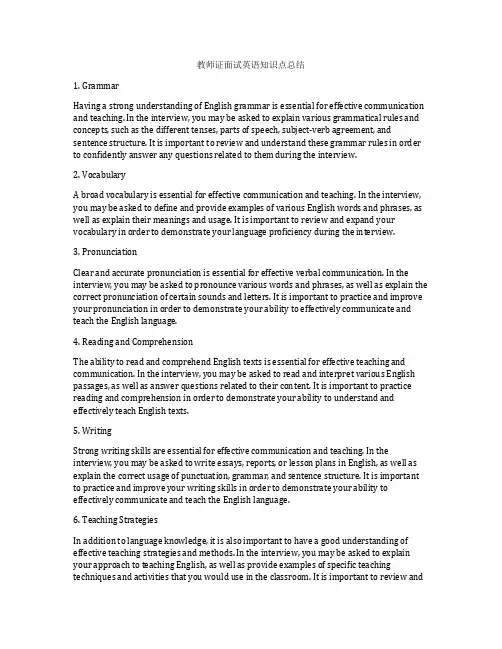
教师证面试英语知识点总结1. GrammarHaving a strong understanding of English grammar is essential for effective communication and teaching. In the interview, you may be asked to explain various grammatical rules and concepts, such as the different tenses, parts of speech, subject-verb agreement, and sentence structure. It is important to review and understand these grammar rules in order to confidently answer any questions related to them during the interview.2. VocabularyA broad vocabulary is essential for effective communication and teaching. In the interview, you may be asked to define and provide examples of various English words and phrases, as well as explain their meanings and usage. It is important to review and expand your vocabulary in order to demonstrate your language proficiency during the interview.3. PronunciationClear and accurate pronunciation is essential for effective verbal communication. In the interview, you may be asked to pronounce various words and phrases, as well as explain the correct pronunciation of certain sounds and letters. It is important to practice and improve your pronunciation in order to demonstrate your ability to effectively communicate and teach the English language.4. Reading and ComprehensionThe ability to read and comprehend English texts is essential for effective teaching and communication. In the interview, you may be asked to read and interpret various English passages, as well as answer questions related to their content. It is important to practice reading and comprehension in order to demonstrate your ability to understand and effectively teach English texts.5. WritingStrong writing skills are essential for effective communication and teaching. In the interview, you may be asked to write essays, reports, or lesson plans in English, as well as explain the correct usage of punctuation, grammar, and sentence structure. It is important to practice and improve your writing skills in order to demonstrate your ability to effectively communicate and teach the English language.6. Teaching StrategiesIn addition to language knowledge, it is also important to have a good understanding of effective teaching strategies and methods. In the interview, you may be asked to explain your approach to teaching English, as well as provide examples of specific teaching techniques and activities that you would use in the classroom. It is important to review andunderstand various teaching strategies in order to demonstrate your ability to effectively teach the English language to your students.In conclusion, being well-prepared for the English language knowledge points discussed above will help you confidently navigate the teacher certification interview and demonstrate your proficiency as a teacher of the English language. By reviewing and practicing these key language knowledge points, you can further enhance your language skills and increase your chances of successfully obtaining a teaching certificate. Good luck!。
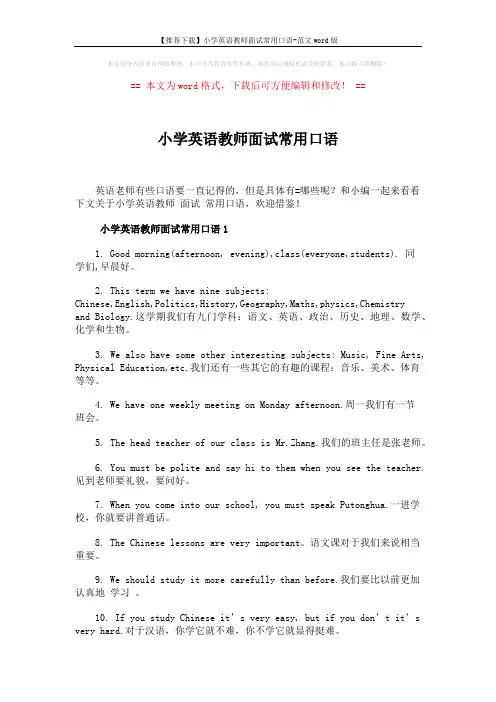
本文部分内容来自网络整理,本司不为其真实性负责,如有异议或侵权请及时联系,本司将立即删除!== 本文为word格式,下载后可方便编辑和修改! ==小学英语教师面试常用口语英语老师有些口语要一直记得的,但是具体有=哪些呢?和小编一起来看看下文关于小学英语教师面试常用口语,欢迎借鉴!小学英语教师面试常用口语11. Good morning(afternoon, evening),class(everyone,students). 同学们,早晨好。
2. This term we have nine subjects:Chinese,English,Politics,History,Geography,Maths,physics,Chemistryand Biology.这学期我们有九门学科:语文、英语、政治、历史、地理、数学、化学和生物。
3. We also have some other interesting subjects: Music, Fine Arts, Physical Education,etc.我们还有一些其它的有趣的课程:音乐、美术、体育等等。
4. We have one weekly meeting on Monday afternoon.周一我们有一节班会。
5. The head teacher of our class is Mr.Zhang.我们的班主任是张老师。
6. You must be polite and say hi to them when you see the teacher.见到老师要礼貌,要问好。
7. When you come into our school, you must speak Putonghua.一进学校,你就要讲普通话。
8. The Chinese lessons are very important。
语文课对于我们来说相当重要。
9. We should study it more carefully than before.我们要比以前更加认真地学习。
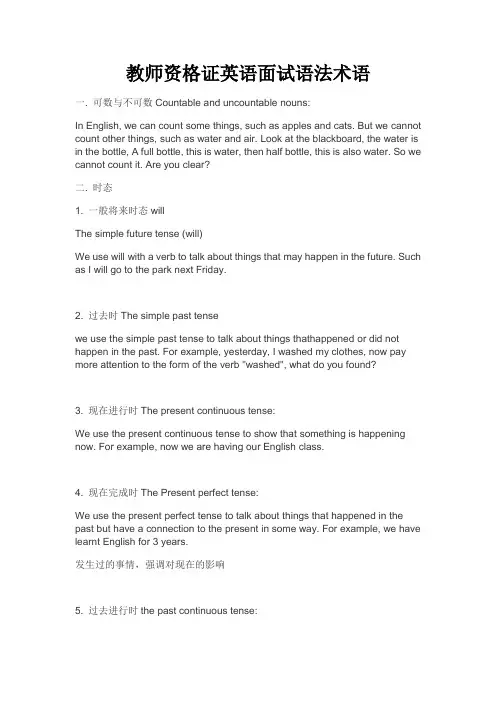
教师资格证英语面试语法术语一. 可数与不可数Countable and uncountable nouns:In English, we can count some things, such as apples and cats. But we cannot count other things, such as water and air. Look at the blackboard, the water is in the bottle, A full bottle, this is water, then half bottle, this is also water. So we cannot count it. Are you clear?二. 时态1. 一般将来时态willThe simple future tense (will)We use will with a verb to talk about things that may happen in the future. Such as I will go to the park next Friday.2. 过去时The simple past tensewe use the simple past tense to talk about things thathappened or did not happen in the past. For example, yesterday, I washed my clothes, now pay more attention to the form of the verb "washed", what do you found?3. 现在进行时The present continuous tense:We use the present continuous tense to show that something is happening now. For example, now we are having our English class.4. 现在完成时The Present perfect tense:We use the present perfect tense to talk about things that happened in the past but have a connection to the present in some way. For example, we have learnt English for 3 years.发生过的事情,强调对现在的影响5. 过去进行时the past continuous tense:We use the past continuous tense to talk about actions that were happening ata particular time in the past.三. 形容词1. 比较级The comparative of adjectives:When we compare two people or things, we can use the comparative of adjectives.2. 最高级The superlative of adjectives:When we compare more than two people or things, we sue the superlative of adjectives.四. 从句时间状语从句Adverbial clauses of time (when)We can use the conjunction when to form an adverbial clause of time. It links two clauses into one sentence.结果状语从句Adverbial clauses of resultWe can use so/such… that to talk about the result of an action or situation. These clauses are called adverbial clause of result.目的状语从句Adverbial clauses of purposeWe can use so that+ a clause to talk about purpose. This is called an adverbial clause of purpose.条件句。
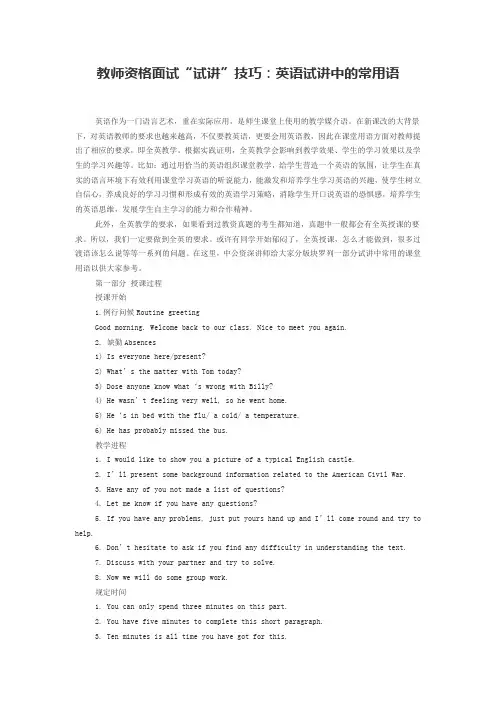
教师资格面试“试讲”技巧:英语试讲中的常用语英语作为一门语言艺术,重在实际应用,是师生课堂上使用的教学媒介语。
在新课改的大背景下,对英语教师的要求也越来越高,不仅要教英语,更要会用英语教,因此在课堂用语方面对教师提出了相应的要求,即全英教学。
根据实践证明,全英教学会影响到教学效果、学生的学习效果以及学生的学习兴趣等。
比如:通过用恰当的英语组织课堂教学,给学生营造一个英语的氛围,让学生在真实的语言环境下有效利用课堂学习英语的听说能力,能激发和培养学生学习英语的兴趣,使学生树立自信心,养成良好的学习习惯和形成有效的英语学习策略,消除学生开口说英语的恐惧感,培养学生的英语思维,发展学生自主学习的能力和合作精神。
此外,全英教学的要求,如果看到过教资真题的考生都知道,真题中一般都会有全英授课的要求。
所以,我们一定要做到全英的要求。
或许有同学开始郁闷了,全英授课,怎么才能做到,很多过渡语该怎么说等等一系列的问题。
在这里,中公资深讲师给大家分版块罗列一部分试讲中常用的课堂用语以供大家参考。
第一部分授课过程授课开始1.例行问候Routine greetingGood morning. Welcome back to our class. Nice to meet you again.2. 缺勤Absences1) Is everyone here/present?2) What’s the matter with Tom today?3) Dose anyone know what‘s wrong with Billy?4) He wasn’t feeling very well, so he went home.5) He‘s in bed with the flu/ a cold/ a temperature.6) He has probably missed the bus.教学进程1. I would like to show you a picture of a typical English castle.2. I’ll present some background information related to the American Civil War.3. Have any of you not made a list of questions?4. Let me know if you have any questions?5. If you have any problems, just put yours hand up and I’ll come round and try to help.6. Don’t hesitate to ask if you find any difficulty in understanding the text.7. Discuss with your partner and try to solve.8. Now we will do some group work.规定时间1. You can only spend three minutes on this part.2. You have five minutes to complete this short paragraph.3. Ten minutes is all time you have got for this.4. You are expected to compose your composition in ten minutes.动作1. Stand by your desks.2. Stand in a raw. 站成一排。
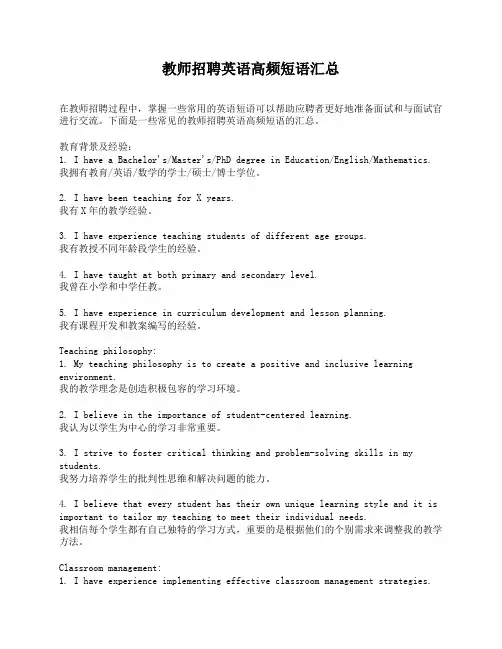
教师招聘英语高频短语汇总在教师招聘过程中,掌握一些常用的英语短语可以帮助应聘者更好地准备面试和与面试官进行交流。
下面是一些常见的教师招聘英语高频短语的汇总。
教育背景及经验:1. I have a Bachelor's/Master's/PhD degree in Education/English/Mathematics. 我拥有教育/英语/数学的学士/硕士/博士学位。
2. I have been teaching for X years.我有X年的教学经验。
3. I have experience teaching students of different age groups.我有教授不同年龄段学生的经验。
4. I have taught at both primary and secondary level.我曾在小学和中学任教。
5. I have experience in curriculum development and lesson planning.我有课程开发和教案编写的经验。
Teaching philosophy:1. My teaching philosophy is to create a positive and inclusive learning environment.我的教学理念是创造积极包容的学习环境。
2. I believe in the importance of student-centered learning.我认为以学生为中心的学习非常重要。
3. I strive to foster critical thinking and problem-solving skills in my students.我努力培养学生的批判性思维和解决问题的能力。
4. I believe that every student has their own unique learning style and it is important to tailor my teaching to meet their individual needs.我相信每个学生都有自己独特的学习方式,重要的是根据他们的个别需求来调整我的教学方法。
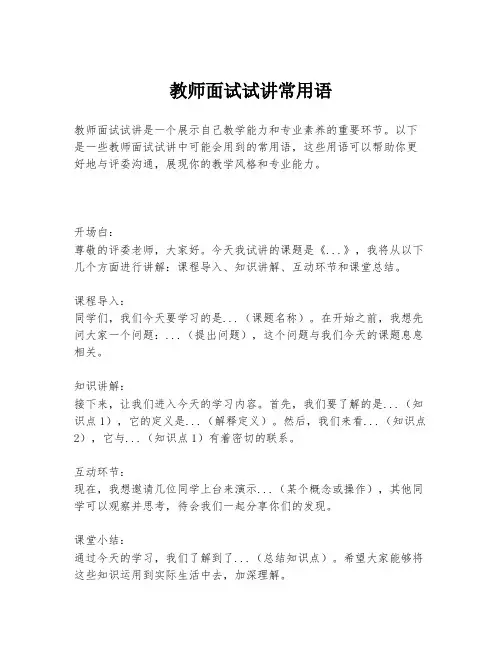
教师面试试讲常用语
教师面试试讲是一个展示自己教学能力和专业素养的重要环节。
以下是一些教师面试试讲中可能会用到的常用语,这些用语可以帮助你更好地与评委沟通,展现你的教学风格和专业能力。
开场白:
尊敬的评委老师,大家好。
今天我试讲的课题是《...》,我将从以下几个方面进行讲解:课程导入、知识讲解、互动环节和课堂总结。
课程导入:
同学们,我们今天要学习的是...(课题名称)。
在开始之前,我想先问大家一个问题:...(提出问题),这个问题与我们今天的课题息息相关。
知识讲解:
接下来,让我们进入今天的学习内容。
首先,我们要了解的是...(知识点1),它的定义是...(解释定义)。
然后,我们来看...(知识点2),它与...(知识点1)有着密切的联系。
互动环节:
现在,我想邀请几位同学上台来演示...(某个概念或操作),其他同学可以观察并思考,待会我们一起分享你们的发现。
课堂小结:
通过今天的学习,我们了解到了...(总结知识点)。
希望大家能够将这些知识运用到实际生活中去,加深理解。
提问环节:
在课程的最后,我想看看大家对今天学习的内容理解得如何。
哪位同
学愿意回答这个问题:...(提出问题)?
结束语:
感谢大家的积极参与,今天的试讲到此结束。
如果评委老师们有任何
问题或建议,我非常乐意听取。
再次感谢各位的聆听。
使用这些常用语可以帮助你构建一个流畅、有条理的试讲过程,同时
也能够展现出你的教学风格和对课堂的掌控能力。
记得在实际试讲中,根据具体的教学内容和学生的反应灵活调整用语。
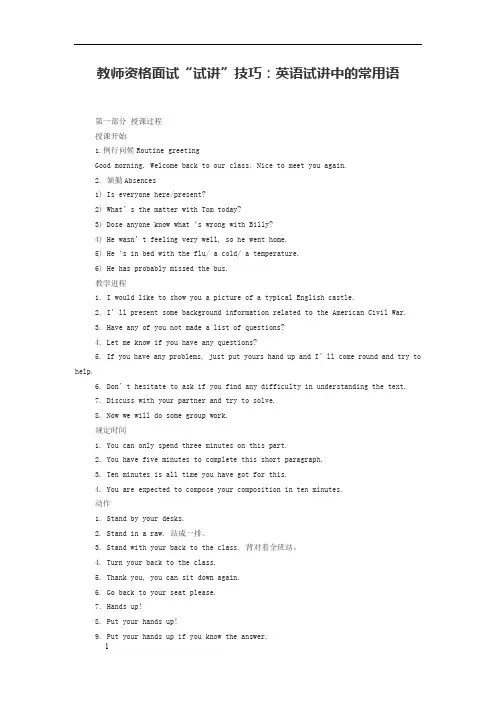
教师资格面试“试讲”技巧:英语试讲中的常用语第一部分授课过程授课开始1.例行问候Routine greetingGood morning. Welcome back to our class. Nice to meet you again.2. 缺勤Absences1) Is everyone here/present?2) What’s the matter with Tom today?3) Dose anyone know what‘s wrong with Billy?4) He wasn’t feeling very well, so he went home.5) He‘s in bed with the flu/ a cold/ a temperature.6) He has probably missed the bus.教学进程1. I would like to show you a picture of a typical English castle.2. I’ll present some background information related to the American Civil War.3. Have any of you not made a list of questions?4. Let me know if you have any questions?5. If you have any problems, just put yours hand up and I’ll come round and try to help.6. Don’t hesitate to ask if you find any difficulty in understanding the text.7. Discuss with your partner and try to solve.8. Now we will do some group work.规定时间1. You can only spend three minutes on this part.2. You have five minutes to complete this short paragraph.3. Ten minutes is all time you have got for this.4. You are expected to compose your composition in ten minutes.动作1. Stand by your desks.2. Stand in a raw. 站成一排。
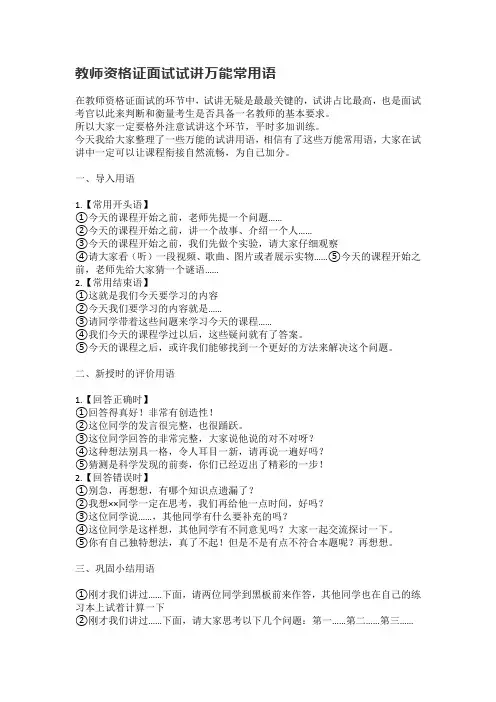
教师资格证面试试讲万能常用语在教师资格证面试的环节中,试讲无疑是最最关键的,试讲占比最高,也是面试考官以此来判断和衡量考生是否具备一名教师的基本要求。
所以大家一定要格外注意试讲这个环节,平时多加训练。
今天我给大家整理了一些万能的试讲用语,相信有了这些万能常用语,大家在试讲中一定可以让课程衔接自然流畅,为自己加分。
一、导入用语1.【常用开头语】①今天的课程开始之前,老师先提一个问题……②今天的课程开始之前,讲一个故事、介绍一个人……③今天的课程开始之前,我们先做个实验,请大家仔细观察④请大家看(听)一段视频、歌曲、图片或者展示实物……⑤今天的课程开始之前,老师先给大家猜一个谜语……2.【常用结束语】①这就是我们今天要学习的内容②今天我们要学习的内容就是……③请同学带着这些问题来学习今天的课程……④我们今天的课程学过以后,这些疑问就有了答案。
⑤今天的课程之后,或许我们能够找到一个更好的方法来解决这个问题。
二、新授时的评价用语1.【回答正确时】①回答得真好!非常有创造性!②这位同学的发言很完整,也很踊跃。
③这位同学回答的非常完整,大家说他说的对不对呀?④这种想法别具一格,令人耳目一新,请再说一遍好吗?⑤猜测是科学发现的前奏,你们已经迈出了精彩的一步!2.【回答错误时】①别急,再想想,有哪个知识点遗漏了?②我想××同学一定在思考,我们再给他一点时间,好吗?③这位同学说……,其他同学有什么要补充的吗?④这位同学是这样想,其他同学有不同意见吗?大家一起交流探讨一下。
⑤你有自己独特想法,真了不起!但是不是有点不符合本题呢?再想想。
三、巩固小结用语①刚才我们讲过……下面,请两位同学到黑板前来作答,其他同学也在自己的练习本上试着计算一下②刚才我们讲过……下面,请大家思考以下几个问题:第一……第二……第三……③刚才我们讲过……下面,请大家设置一个表格对我们刚才所讲的知识点进行总结。
④下面同学们和老师一起回忆一下,本节课我们都讲过哪些重点内容……⑤下面我请一位同学来归纳一下,本节课的主要内容……。
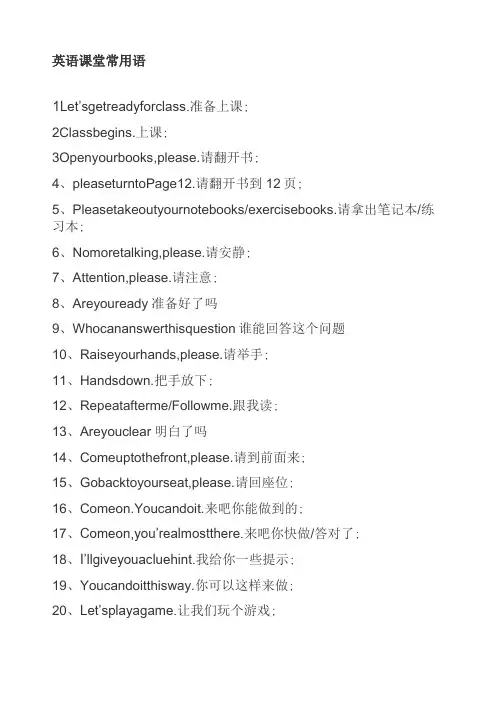
英语课堂常用语1Let’sgetreadyforclass.准备上课;2Classbegins.上课;3Openyourbooks,please.请翻开书;4、pleaseturntoPage12.请翻开书到12页;5、Pleasetakeoutyournotebooks/exercisebooks.请拿出笔记本/练习本;6、Nomoretalking,please.请安静;7、Attention,please.请注意;8、Areyouready准备好了吗9、Whocananswerthisquestion谁能回答这个问题10、Raiseyourhands,please.请举手;11、Handsdown.把手放下;12、Repeatafterme/Followme.跟我读;13、Areyouclear明白了吗14、Comeuptothefront,please.请到前面来;15、Gobacktoyourseat,please.请回座位;16、Comeon.Youcandoit.来吧你能做到的;17、Comeon,you’realmostthere.来吧你快做/答对了;18、I’llgiveyouacluehint.我给你一些提示;19、Youcandoitthisway.你可以这样来做;20、Let’splayagame.让我们玩个游戏;21、AreyoutiredLet’stakeabreak.累了吗休息一下;22、Doyouhaveanyquestions你们有问题吗23、Bebrave/active,please.请勇敢/主动些;24、Ibegyourpardon对不起,能再说一遍吗Yes.You’reright.对,你对了;25、Putupyourhandsifyouhaveanyquestions.如果有问题请举手;26、Takeiteasy.请放心/别紧张;Fromtheverybeginning.从头开始;27、Let’shaveadictation.让我们来听写;28、Letmesee.让我看看/想想;29Listentome,please.请听我说;30Lookattheblackboard/screen,please.请看黑板/屏幕; WatchmeandI'llshowyou.看着我,我来演示;31Alleyesonme,please.请都看着我;32Canyousolvethisproblem能做出这道题吗33Let’sreadittogether.Ready,go大家齐声朗读,预备,起;34Readslowlyandclearly.读慢一点,清楚一点;35Whowantstotry谁想试一试36Whowantstodoitontheblackboard谁愿意到黑板上来做37Areyouthrough做完了吗38Haveyoufinished做完了吗39Youdidaverygoodjob.做得不错;40Verygood./Goodtry./Welldone完成得不错;41Terrific/Wonderful/Excellent很棒42Pleasegivehimherabighand.请给他/她一些掌声;43Canyoufollowme能跟上吗44Doyouunderstand你听懂了吗45Don’tbenervous.不要紧张;46Anyonecanhelphim/her谁来帮他/她一下47、That’sallfortoday.今天就到这48、Westopherefortoday.今天就到这;49、Let’scallitaday.今天就到这;50、Here’syourhomeworkfortoday.这是今天的家庭作业;50、Don’tcopyothers’work.不要抄别人的作业;51、Classisover.Thankyou,class.下课;谢谢52、Good-bye./Seeyoutomorrow.再见/明天见53、Iseveryonehere都到齐了吗54、Who’sabse nttoday今天谁没来55、Whatdayistoday今天是星期几56、What’sthedatetoday今天是几号57、Who’sondutytoday今天谁值日58、Hereareyourexercise-books.Pleasehandthemout.这是练习本,请发下去;59、Monitor,wouldyoupleasefetchsomechalkforme班长,能帮我去拿些粉笔来吗60Lookupthewordinthedictionary.在字典里查这个词;61Takenotes,please.请作笔记;62LiHong,haveyoucollectedalltheexercise-books李红,作业本都收齐了吗63Isthatright/correct那个正确吗64Canyoufindthemistakes你能找出错误吗65Doyouknowhowtocorrectthemistakes你知道怎么改错吗67Canyouguessit能猜猜吗68、I’msorryI’mlate./Excusemeforcominglate.对不起,我迟到了;69、Pleasecomeearliernexttime.下次请早点到;70Takeyourtime.慢慢来;71Useyourhead.动动脑筋;72GoodideaThatmakessense.好主意;有道理;73Whoseturnisit轮到谁了74Nowyou’regoingtoreadonebyone.现在你们依次朗读;75Who’snext接下来是谁76You’renext.接下来是你;77It’syourturn.轮到你了;78Justhands.Novoices.不要说,请举手;79Doitonyourown.自己做;80We’regoingtohaveanewlessontoday.今天我们要上新课;81Firstlet’shavearevision.首先我们复习一下;82Pleasereadittotheend.请读到结尾;83Stophere,please.请停下来;84Handsupbeforeyouanswer.回答问题前,请举手;85Handinyourhomeworktomorrow.家庭作业明天交;86Pleasepasstheexercisebookstothefront.请将练习本递到前面来;87Whowantstocometothefront谁愿意到前面来88Cometomyofficeafterclass.下课后到办公室找我;89Comeandseemeafterclass.课后找我;90I’msorrytohavekeptyousolong.对不起耽搁大家了;91Iwantallofyoutoanswerthisquestion.我请大家一齐来回答这个问题;92That’sallforthenewlesson/revision.新课/复习就到这儿;93Iwantyoutoworkinpairs/groups.请大家做对子/小组练习;授课:1. Who can read it aloud first 哪位能先朗读2. Hands up, please. 请举手示意我;3. Don’t worry calm down, slow down.不必紧张;4. Speak up, please. 请大声说;voicetimbre, tone sounds sweet.你的声音很好听;6. Please read it follow me quietly lowly7. First, let me read the text aloud8. Now let’s speak freely.现在请大家畅所欲言;'s allso much for the class .Time's up.下课时间已到,本课时就讲这么多;10. Do you understand what I said just now 大家明白我刚才说的意思吗11. Whose turn is it today 轮到谁了12. Are you ready now 准备好了吗13. Next class, we’re going to learn Lesson Five.下节课,我们要学习第五课;14. What’s the weather like today今天天气怎么样15. Great day today, isn't it 今天天不错,是吧16. We’ll look at some difficult points in this text.我们要看一下这篇课文的难点;17. I hope you can do it well by yourselves.我希望大家能自己做好;18. Everyone, you’re doing a great job.大家都干得不错;19. Could you please try it again 你可以在试一次20. Can you try 你想试试吗21. Don’t be afraid / shy. 不要害羞22. Follow me, please. 跟着我23. Put your hand up, please. Raise your hand, lease.24. Put your hands down, please. / Hands downs, please. 举手示意25. Please open your books at page … / Turn to page …翻开你们的课本..页课堂活动Classroom activities1. Start / Start now. 现在开始吧2. Everybody together. / All together. 大家一起来3. Practice in a group. / Practice in groups. / In groups, please.小组联系4. Get into groups of three / four …三人一组/四人一组5. Everybody find a partner / friend. 每个人找一个搭档6. In pairs, please.7. One at a time. / Let’s do it one by one.8. Now you, please. / Your turn Student’s name.轮到你了,你来9. Next, please. Now you do the same, please.10. Let’s act. / Let’s act out / do the dialogue.11. Who wants to be A 谁想当A12. Practise the dialogue, please.13. Now Tom will be A, and the other half will be B.现在Tom是A,其余的都是B14. Please take play the part of …15. Whose turn is it 接下来谁上16. it’s your turn.轮到你了17. Wait your turn, please.18. Stand in line. / Line up.19. One by one. / One at a time, please.20. In twos. / In pairs.21. Don’t speak out.22. Turn around. 轮流来评价1.Good, thank you. 很好,谢谢2.Good / Very good. / Good job. / Good work. / Good wxample.非常好3.A good answer. / Nice work. 回答的不错4.Excellent. / Great / Well done. / Very good. / I like the way you …真棒5.That’s interesting很有趣的答案;6.Don’t worry about it. / No problem.不要紧张,没问题7.OK / That’s OK.8.I don’t think so.我不这么认为;9.That’s not quite right, any other answers / That’s close. / That’s almost right.有其他问题吗10.N ot quite, can anyone help him / her / Try again.谁想帮帮他来试试11.A good try.a)You worked really hard today.b)What a good listener.c)You learned it right.d)You're on your way.e)You can do it.f)You'll make it.g)I'm proud of you./ You're a winner12.Y ou worked really hard today.13.Y ou listened well today.布置作业Setting homework1.For today’s homework …2.Practise after class. / Practise at home.3.Say it out loud, before you write it down.4.Copy / Print / Write each word twice.5.Remember Memorize these words / sentences.记住这些单词和句子6.Learn these words / these sentences / this text by heart.7.Do your homework. / Do the next lesson. / Do the new work.8.I'll give you some homework to do, everyone of you must do it well,ok我给大家布置一些作业,大家能够尽力做好吗下课Dismissing the class1.Hand in your workbooks, please.2.Time is up. 时间到了3.The bell is ringing. 下课铃响了4.There’s the bell.5.There goes the bell.6.Let’s stop here.好了,就到这7.That’s all for today.8.Class is over. 这节课结束了9.Goodbye. / Bye. / See you next time. 再见。
2019下教师资格面试真题:《初中英语》试讲1.语法,一般疑问句2.给一段话英语写作3.关于人物的写作4.阅读,英文招聘信息,要求朗读,做后续的备课5.关于英国夏令时和寒暑假的一篇阅读6.口语,喜欢什么小动物7.用英文介绍自己8.阅读9.听力教学,一个新同学的介绍10.写作的三要素,what how wher when11.if的条件句型12.听力,讨论日常生活13.关于一日三餐14.庆祝一个人过生日,怎么庆祝,会得到什么礼物15.What are you going to be when you grow up?can you play the guitar?语法:被动语态16.语法,单复数17.口语,最喜欢的动物是什么?18.词汇,给一段对话,讲其中的单词,鸡肉、牛奶等呈现类词汇19.材料,你以后想当什么20.语音,长元音21.听力,Scott和lucy打电话,Scott问lucy其他家人在干嘛22.写作applicantion学校招聘23.短语come from和come with的区别24.口语喜欢大象和狗25.词汇breakfast lunch supper26.Will people have robots27.My birthday28.写作,爱因斯坦的生平,座右铭,成就29.给一段材料,讲早餐、午餐、晚餐三个单词30.阅读,文章题目你想去月亮上住吗31.语音连读32.爱因斯坦生平33.你最喜欢的动物是什么34.口语一个人想学汉语小对话35.关于班级聚会的听力36.语法any some的区别37.阅读:spend holidays in the hotels on the moon要求朗读课文设计读前活动38.听力最喜欢的季节39.听力是否想和父亲一样喜欢警察的职业40.词汇egg milk chicken41.语调升降调42.口语是讲关于牛奶的对话。
对话内容为:你喜欢喝牛奶吗?我每天都喝牛奶,你为什么要喝牛奶呢?我妈妈让我喝牛奶,她觉得喝牛奶身体会健康。
教师资格考试英语面试语法术语英文大全第一篇:教师资格考试英语面试语法术语英文大全从句clause从属句subordinate clause并列句coordinate clause名词从句 nominal clause定语从句 attributive clause状语从句 adverbial clause宾语从句 object clause主语从句 subject clause 同位语从句appositive clause时间状语从句adverbial clause of time地点状语从句 adverbial clause of place方式状语从句 adverbial clause of manner让步状语从句 adverbial clause of concession原因状语从句adverbial clause of cause结果状语从句adverbial clause of result目的状语从句 adverbial clause of purpose条件状语从句adverbial clause of condition真实条件状语从句adverbial clause ofreal condition非真实条件状语从句adverbial clause of unreal condition句子sentence简单句simple sentence并列句compound sentence复合句complex sentence并列复合句compound complex sentence陈述句declarative sentence疑问句interrogative sentence一般疑问句general question特殊疑问句special question选择疑问句alternative question附加疑问句tag question反义疑问句disjunctive question修辞疑问句rhetorical question感叹疑问句exclamatory question 存在句existential sentence肯定句 positive sentwence否定句 negative sentence祈使句imperative sentence省略句elliptical sentence感叹句exclamatory sentence基本句型 basic sentence patern 人称 person第一人称 first person第二人称 second person第三人称 third person一致 agreement主谓一致 subject-predicate agreement语法一致 grammatical agreement概念一致 notional agreement就近原则principle of proximity语态voice主动语态active voice被动语态passive voice 语气mood陈述语气indicative mood祈使语气imperative mood虚拟语气 subjunctive mood句子成分members of sentences主语subject谓语predicate 宾语object双宾语dual object直接宾语direct object间接宾语indirect object复合宾语 complex object同源宾语 cognate object 补语complement主补subject complement宾补object complement表语predicative定语attribute同位语appositive状语 adverbial 时态 tense过去将来时 past future tense过去将来进行时past future continuous tense过去将来完成时past future perfect tense一般现在时present simple tense一般过去时past simple tense一般将来时future simple tense现在完成时past perfect tense过去完成时 present perfect tense将来完成时 future perfect tense现在进行时present continuous tense过去进行时past continuous tense将来进行时 future continuous tense过去将来进行时past future continuous tense现在完成进行时present perfect continuous tense过去完成进行时 past perfect continuous tense否定negation否定范围scope of negation全部否定full negation局部否定 partial negation转移否定 shift of negation语序order自然语序natural order倒装语序inversion全部倒装full inversion部分倒装 partial inversion 直接引语 direct speech间接引语indirect speech自由直接引语free direct speech自由间接引语free indirect speech语法 grammar句法 syntax词法 morphology结构 structure层次 rank句子 sentence从句 clause词组 phrase词类 part of speech 单词 word实词 notional word虚词 structural word单纯词simple word派生词derivative复合词compound词性part of speech名词noun专有名词proper noun普通名词common noun可数名词countable noun不可数名词 uncountable noun抽象名词 abstract noun具体名词concret noun物质名词material noun集体名词collective noun个体名词individual noun介词preposition连词conjunction动词verb主动词main verb及物动词transitive verb不及物动词intransitive verb系动词link verb助动词auxiliary verb情态动词modal verb规则动词 regular verb不规则动词 irregular verb短语动词 phrasal verb限定动词 finite verb非限定动词 infinite verb使役动词 causative verb感官动词 verb of senses动态动词 event verb静态动词 state verb感叹词 exclamation形容词 adjective副词 adverb 方式副词adverb of manner程度副词adverb of degree时间副词adverb of time地点副词 adverb of place修饰性副词 adjunct连接性副词conjunct疑问副词interogative adverb关系副词relative adverb代词pronoun人称代词personal pronoun物主代词possesive pronoun反身代词 reflexive pronoun相互代词 reciprocal pronoun指示代词 demonstrative pronoun疑问代词 interrogative pronoun关系代词relative pronoun不定代词indefinite pronoun 物主代词possecive pronoun名词性物主代词nominal possesive prnoun形容词性物主代词adjectival possesive pronoun冠词article定冠词definite article不定冠词indefinite article数词numeral基数词cardinal numeral序数词ordinal numeral分数词fractional numeral形式form单数形式singular form复数形式plural form限定动词finite verb form非限定动词non-finite verb form原形 base form从句 clause从属句 subordinate clause并列句coordinate clause名词从句nominal clause定语从句attributive clause状语从句adverbial clause宾语从句object clause主语从句subject clause同位语从句appositive clause时间状语从句adverbial clause of time地点状语从句 adverbial clause of place方式状语从句adverbial clause of manner让步状语从句adverbial clause of concession原因状语从句 adverbial clause of cause结果状语从句 adverbial clause of result目的状语从句 adverbial clause of purpose条件状语从句 adverbial clause of condition真实条件状语从句adverbial clause of real condition非真实条件状语从句adverbial clause of unreal condition含蓄条件句 adverbial clause of implied condition错综条件句adverbial clause of mixed condition句子 sentence简单句 simple sentence并列句 compound sentence复合句complex sentence并列复合句compound complex sentence陈述句declarative sentence疑问句interrogative sentence一般疑问句general question特殊疑问句special question选择疑问句alternative question附加疑问句tag question反义疑问句disjunctive question修辞疑问句rhetorical question感叹疑问句exclamatory question存在句existential sentence肯定句 positive sentence基本句型 basic sentence patern 否定句negative sentence祈使句imperative sentence省略句elliptical sentence感叹句exclamatory sentence句子成分members of sentences主语 subject谓语 predicate宾语 object双宾语 dual object直接宾语 direct object间接宾语 indirect object复合宾语 complex object同源宾语 cognate object补语 complement 主补subject complement宾补object complement表语predicative定语 attribute同位语 appositive状语 adverbial句法关系syntatic relationship并列coordinate从属subordination修饰modification前置修饰pre-modification后置修饰post-modification限制restriction双重限制double-restriction非限制non-restriction数 number单数形式 singular form复数形式 plural form规则形式 regular form不规则形式 irregular form格 case普通格 common case所有格 possessive case主格 nominative case宾格objective case性gender阳性masculine阴性feminine通性common中性neuter人称person第一人称first person第二人称second person第三人称 third person时态 tense过去将来时 past future tense过去将来进行时 past future continuous tense过去将来完成时past future perfect tense一般现在时present simple tense一般过去时 past simple tense一般将来时 future simple tense现在完成时 past perfect tense过去完成时 present perfect tense将来完成时future perfect tense现在进行时present continuous tense过去进行时past continuous tense将来进行时future continuous tense过去将来进行时 past future continuous tense现在完成进行时present perfect continuous tense过去完成进行时 past perfect continuous tense语态 voice主动语态 active voice被动语态 passive voice语气mood陈述语气indicative mood祈使语气imperative mood虚拟语气subjunctive mood否定negation否定范围scope of negation全部否定 full negation局部否定 partial negation转移否定 shift of negation语序 order自然语序 natural order倒装语序inversion全部倒装 full inversion部分倒装 partial inversion直接引语 direct speech间接引语 indirect speech自由直接引语 free direct speech自由间接引语 free indirect speech一致 agreement主谓一致 subject-predicate agreement语法一致 grammatical agreement 概念一致 notional agreement就近原则 principle of proximity强调emphasis重复 repetition语音 pronunciation语调 tone升调 rising tone降调 falling tone降升调 falling-rising tone文体 style正式文体formal非正式文体informal口语spoken/oral English套语formulistic expression英国英语 British English美国英语 American English用法usage感情色彩emotional coloring褒义commendatory贬义 derogatory幽默 humorous讽刺 sarcastic挖苦 ironic第二篇:2014教师资格考试面试中小学和幼儿园教师资格考试大纲(试行)(面试部分)教育部师范教育司教育部考试中心二零一一年七月一、测试性质面试是中小学教师资格考试的有机组成部分,属于标准参照性考试。
英语教师资格面试课堂用语入场开头Dear judges,I am delighted to be here to present my lesson. My contestant number is........ I have been ready.May I begin now?1上课开头用语1.Good morning /afternoon, boys and girls / teacher/同学们/老师们,早晨好/下午好2.Hello, boys and girls / children.同学们好!3. Let's start class. =It's time for class. 上课3.Stand up / Sit down, please.起立/请坐。
5. Who is on duty today? 今天谁值日?6. Let's begin our class. 咱们上课吧.7. We'll start / begin a new lesson today.今天我们讲学习新课.8. What day is it today? 今天星期几?9.Dear judges. May I begin now?10.My contestant number is.......2课堂上13.Let's begin a new lesson.我们开始学新课。
14. We'll learn something new .我们讲学新知识。
15. Let's learn some new words/ sentences. 咱们学些新单词/句子。
16. Let's review what we learned yesterday.咱们复习一下昨天学过的内容。
17. Ready? Are you ready? 准备好了吗?18. Start. 开始。
1.请大家进来坐好。
Everyone, please come in and sit down.2.我想先讲个小故事。
I’d like to start with a short story.3.我要检验一下大家的背景知识。
I’m going to check your background knowledge.4.请为上课做好准备。
Please get everything ready for class.5.快点,马上就要上课了。
H urry up. It’s nearly for class.6.你最好快一点儿。
You’d better ge t a move on.7.请回到座位。
Go back to your seat, please.8.大家准备好了么Are you ready to begin9.我将等你们安静下来,好么I’ll wait for you to b e quiet. OK10.请保持安静,马上就要上课了。
Be quiet, please. Class will soon begin.11.还有几分钟开始上课How many minutes are there to go12.正好打铃呢,你刚好赶上。
There goes the bell, you’re just in time.13.各位坐好。
Get seated, everyone.14.请坐好。
Sit straight, please.1.我们开始上课好吗?Shall we begin today’s lesson2.书归正传,咱们开始上课吧。
Time to get to the point.3.现在,咱们开始学习新课。
Now, let’s start today’s lesson.4.上课时间到了。
It’s time for class.5.让我们开始上课。
Let’s start our class.6.我们学习新的一课。
必修一语法点一:Be+v.ing表将来use the present continuous tense for future plansIn English,we have lots of ways of talking about the future.The most common ways of talking about the future is that we use‘will’or‘be going to’followed by an infinitive(动词原形), and we tend to use‘be going to’most often for talking about future plans.Sometimes,we also use the present continuous tense to talk about future plans.Ex.①we are going to Mexico next Sunday..②are you coming to the cinema?.③he is leaving for London in two hours..④we are spending next winter in Australia.Only some verbs can be used in this situation,such as:go,arrive,come,leave,start,stay, return,play,have,work,wear,spend,see,meet,etc.扩展:What’s the difference between using‘be going to’and the present continuous to talk about future plans?Let’s look at some more examples:“I’m going to play football on Saturday”You have made a plan in your head but possibly not taken any real action to confirm it.Also, playing football on Saturday is probably not a regular event for you.“I’m playing football on Saturday”You have made a plan and taken some real action to confirm it(e.g.called your friends or booked a place to play).In this case,it’s likely that playing football on Saturdays is a common activity for you.语法点二:Direct speech and indirect speech(直接引语和间接引语)Let's first define the terms,then look at how to talk about what someone said,and how to convert speech from direct to indirect or vice-versa.You can answer the question What did he say?in two ways:1)by repeating the words spoken(direct speech)2)by reporting the words spoken(indirect or reported speech).Direct speech repeats,or quotes,the exact words spoken.When we use direct speech in writing,we place the words spoken between quotation marks("")and there is no change in these words.Reported or indirect speech is usually used to talk about the past,so we normally change the tense of the words spoken.We use reporting verbs like'say','tell','ask',and we may use the word'that'to introduce the reported words.Quotation marks are not used.1.Declarative sentence陈述句①change in pronoun:The pronoun(subject)of the reported speech is changed according to the pronoun of reporting verb or object(person)of reporting verb(first part of sentence). Sometimes the pronoun may not change.In following example the pronoun of reported speech is“I”which will be changed in indirect speech into the pronoun(Subject)of reporting verb that is“he”.He said,“I like it very much.”→He said that he liked it very much.②change in tense:If the first part of sentence(reporting verb part)belongs to past tense, the tense of reported speech will change.If the first part of sentence(reporting verb part) belongs to present or future tense,the tense of reported speech will not change.③change in demonstrative pronoun指示代词,temporal adverbial时间状语,adverbial of place地点状语and verbs.Ps:(1)if the direct speech indicates objective truth,then there is no change in tense when it’s converted to indirect speech.Ex.He said,“Light travels much faster than sound.”→He said that light travels much faster than sound.Ps:(2)如果在当地转述,here不必改成there,come不必改为go,如果在当天转述,yesterday,tomorrow等时间状语也不必改变。
2019教师资格证面试英语试讲必备40句常用语【摘要】教师资格证面试英语学科在试讲时,需要全英试讲,小编这里整理了教师资格证面试英语试讲必备40句常用语,满满干货,一起来记一记!想了解更多考试信息,请关注的及时更新。
1.Let’s get ready for class.准备上课。
2.Class begins.上课。
1.Let’s get ready for class.准备上课。
3.Open your books, please.请翻开书。
4.Please turn to Page 12.请翻开书到12页。
5.Please take out your note books / exercise books.请拿出笔记本/练习本。
6.No more talking, please.请安静。
7.Attention, please.请注意。
8.Are you ready?准备好了吗?9.Who can answer this question? 谁能回答这个问题?10.Raise your hands, please.请举手。
11.Hands down.把手放下。
12.Repeat after me/Follow me. 跟我读。
13.Are you clear ?明白了吗?e up to the front, please. 请到前面来。
15.Go back to your seat, please. 请回座位。
e on. You can do it.来吧!你能做到的。
e on, you’re almost there.来吧!你快(做/答)对了。
18.I’ll give you a clue (hint).我给你一些提示。
19.You can do it this way.你可以这样来做。
20.Let’s play a game.让我们玩个游戏。
21.Are you tired? Let’s take a break.累了吗?休息一下。
2019教师资格证面试英语试讲必备40
句常用语
【摘要】教师资格证面试英语学科在试讲时,需要全英试讲,小编这里整理了教师资格证面试英语试讲必备40句常用语,满满干货,一起来记一记!想了解更多考试信息,请关注的及时更新。
1.Let’s get ready for class.
准备上课。
2.Class begins.
上课。
1.Let’s get ready for class.
准备上课。
3.Open your books, please.
请翻开书。
4.Please turn to Page 12.
请翻开书到12页。
5.Please take out your note books / exercise books.
请拿出笔记本/练习本。
6.No more talking, please.
请安静。
7.Attention, please.
请注意。
8.Are you ready?
准备好了吗?
9.Who can answer this question? 谁能回答这个问题?
10.Raise your hands, please.
请举手。
11.Hands down.
把手放下。
12.Repeat after me/Follow me. 跟我读。
13.Are you clear ?
明白了吗?
e up to the front, please. 请到前面来。
15.Go back to your seat, please. 请回座位。
e on. You can do it.
来吧!你能做到的。
e on, you’re almost there.来吧!你快(做/答)对了。
18.I’ll give you a clue (hint).
我给你一些提示。
19.You can do it this way.
你可以这样来做。
20.Let’s play a game.
让我们玩个游戏。
21.Are you tired? Let’s take a break.
累了吗?休息一下。
22.Do you have any questions?
你们有问题吗?
23.Be brave / active, please.
请勇敢/主动些。
24.I beg your pardon?
对不起,能再说一遍吗?
25.Put up your hands if you have any questions. 如果有问题请举手。
26.Take it easy.
请放心/别紧张。
27.Let’s have a dictation.
让我们来听写。
28.Let me see.
让我看看/想想。
29.Listen to me, please.
请听我说。
30.Look at the blackboard/screen, please.
请看黑板/屏幕。
1
2。